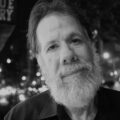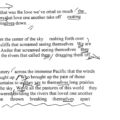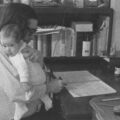Conversations: Raquel Salas Rivera and Annie Won

Annie Won: Raquel, I really enjoyed your reading at Unnameable Books—particularly how your work straddles the bilingual, equally Spanish and English, how most of the Spanish in your work is translated, but not all—and how there is a politics of identity as a queer Boricua poet whose home country is Puerto Rico, but has since resided in the U.S.
Raquel Salas Rivera: Growing up, I lived in different places throughout the U.S., many of which did not have large Puerto Rican populations. English was something I spoke at school and in the world, and Spanish was something I spoke at home. I quickly learned via the U.S. educational system that language and survival can never be disengaged and that dominating English and becoming American are often synonymous.
All of this changed when I moved back to Puerto Rico. I was fourteen and my “return” to the place where both of my parents had grown up was unlike anything I had previously experienced. I don’t think there is a way of transmitting the difference between living in the metropolis and living in the colony. I can only describe what I underwent as decolonization. I take the term decolonization to mean learning dis-dominance. It is not a mental or spiritual process that can be divorced from a struggle against the economic project that is U.S. imperialism. Ironically, the way in which decoloniality has been decontextualized and commoditized, mimics the long-standing colonial practice of pillaging the language of those you oppress, a.k.a. appropriation. In Puerto Rico, the word decolonization still mainly refers to economic and political independence from the United States and is not just a means of diversifying one’s curriculum.
When I arrived in San Juan I was a teenager, so I had concerns about fitting in and tried my best to learn a standardized version of Spanish. It is important to point out that debates about language in Puerto Rico are always debates about the relationship between Puerto Rico and the United States. In its early colonization efforts, the United States government attempted to impose English and failed. This is often held up as an example of how the Puerto Rican people resisted imperialism, but the relationship between language and power becomes more complicated when we consider the Puerto Rican diaspora. A cultural nationalist discourse that has been the crux of anti-imperialist Puerto Rican Nationalism has rejected English-speaking Puerto Ricans on the pretext that language is the bearer of culture. In order to understand cultural nationalism, we have to understand the history of what, throughout his book Literatura y paternalismo en Puerto Rico, Juan Gelpí calls a “paternalistic” literary tradition and how Luis Muñoz Marín’s populism was rooted in the idea that there could be cultural independence without political independence. Cultural nationalist discourse asks that Puerto Ricans perform civilized subjectivity as means of earning our independence, thereby willing independence into being in the face of a seemingly interminable history of subjugation. I can’t give a full summary here because even if I could explain the entire history of Puerto Rico, I still don’t think it would be easy to comprehend for someone who hasn’t experienced any of this first hand. What I can say is that it took me a long time to figure out how I felt about being bilingual.
AW: Inevitably linked to the notions of decolonization and displacement is the notion of home. How do we love what we do, and make peace with what continues to unsettle us?
RSR: I imagine that perhaps someone else with a set of experiences similar to mine might opt to renege any notion of “home,” perhaps envisioning themselves as a cosmopolitan subject, but I don’t feel that way. Puerto Rico was where I learned to have community, where I fought alongside compañerxs against tuition hikes and government cuts, where I had a sexual experience for the first time, where I developed as a poet, where I learned about being near the ocean, and where I felt loved. I’m with Pedro Pietri on this one. I don’t think he was being was being ironic when he envisioned Puerto Rico as a place of LOVE. I know all that is jodido about living in Puerto Rico, especially the things that are the result of colonialism, but I still associate those are things with home. This is why coming to Philadelphia for graduate school four years ago meant moving away from home, not moving back to the U.S.
AW: Having moved to Philadelphia after finding ground in Puerto Rico while coming of age and as a budding writer, how did the move affect your relations to language, your poetry, and your work?
RSR: By the time I arrived in Philadelphia, my first book—Caneca de anhelos turbios—had already been published. Of course, in the U.S., many people couldn’t understand my poetry because it was in Spanish. It took me three years to decide I was going to provide translations for my work. I was concerned that by translating the work, I would make it legible. It is common practice for poets in the U.S. to read only what has been translated into English. By doing so they overlook the complex networks of power that make such translations accessible. They also leave the universality of English unexamined. For example, for a year I wrote alongside poets I deeply admired, all of which wrote in English and none of which ever took the time to read my first book. One could argue that they didn’t read it because it was in Spanish (confirming my point), but even those who were bilingual didn’t feel it was as important to read my work, as it was to read the work of every polemical racist writer they came across. It’s heartbreaking to have to say this, but this too is colonialism.
This is why, when I finally began to translate my work, I wanted to compensate for what—in my essay “Cafrondas”—I call aesthetics of “the good body” by making readers and listeners feel as antagonized as possible within the confines of English. I wanted every translation to tighten into curls, to be cafre, unruly, like the ñ not the n. Everyone who couldn’t roll their rs would have to stumble and force through their mispronounced words in Spanish, to feel as uncomfortable—even if only for a second—as I did in English.
AW: And in that sense, I imagine that your relation to your Puerto Rican roots colors the character of your translations and bilingual writing. Given Puerto Rico’s current debt crisis—could you please tell me more about how your relationship to Puerto Rico’s political and economic climate impacts your creative and critical work?
RSR: Right now I’m writing a book called LO TERCIARIO/THE TERTIARY. The titles of the poems and sections are derived from Pedro Scaron’s El Capital, the 1976 translation of Karl Marx’s classic. Published by Siglo Veintiuno Editores, this translation was commonly used by the Puerto Rican left as part of a political formation program. So the book is centered on a translation, but not just any translation, a translation that was used by generations who were living under a politically repressive government as a means of understanding capitalism, but, more importantly, as a means of understanding why capitalism had to be destroyed. Rather than passing judgment on this text, I wanted to see what would happen if I used it as a framework for these poems.
These translations were constituted by the irrecoverable loss of what cannot be translated. How could I translate the experience of loss that accompanied the devaluation of the Puerto Rican bonds? Rather than insisting that such a translation was possible, I chose to take a step back and consider the fact that loss has been part of Puerto Rican history for a long time.
I also wanted to point at the gap between Marx and Scaron’s—use of terms like “value,” “labor,” and “exchange” and how I engaged with those words. I wanted to implode the form-content binary by juxtaposing the “same” word as it was differently spoken. For example, the poem “‘todas sus propiedades sensibles se han esfumado’/‘all their sensible properties have blended away’” opens with a paraphrasing of Marx’s definition of value, then envisions how “crystallizations of common social substance” are violently forged:
pero el valor que es valor de uso sólo tiene su valor porque tío jun arreglaba sillas,
y porque titi irma perdió la cordura y escribía cartas donde
la letra crecía hasta llenar páginas enteras. fumaba y compartía
con los deambulantes que hacían flores de palmas y las regalaban
—por un peso—te velaban el carro—cuando se tiñó el pelo, luego cuando las raíces crecían claramente oscuras,
cuando se moría de hambre por la desmemoria, luego cuando
se pintaba con delineador 3 centímetros por encima de las pestañas,
sus ojos no cerraban y olía a tabaco estratificado
en aquellas ocasiones y otras, acumulaba, por ejemplo,
valor.tan preciosa que estás y yoli
el alcalde fue a su funeral porque era amada,
dijo, y porque acumuló valor
para el pueblo entero.
but the value that is use value only has its value because tío jun fixed chairs,
and because titi irma lost her mind and wrote letters where
the handwriting grew until it filled entire pages. she smoked and shared
with the homeless that made flowers of palm leaves and would give them away
—for a dollar—they’d watch your car—when she dyed her hair, later when the roots grew clearly dark,
when she was dying of hunger because of the forgetting, later when
she drew with liner 3 centimeters over her lashes,
her eyes wouldn’t close and she smelled of stratified tobacco
on those occasions and others, she accumulated, for example,
value.you’re looking so beautiful and how’s yoli
the mayor went to her funeral because she was loved,
he said, and because she accumulated value
for the whole town.
In The Dialogic Imagination, Mikhail Mikhailovich Bakhtin and his translators Caryl Emerson and Michael Holquist wrote that “prior to [the] moment of appropriation the word does not exist in a neutral and impersonal language […] but rather it exists in other people’s mouths, in other people’s contexts, serving other people’s intentions.” Initially, when I read this, I pushed through my discomfort and suspicion and embraced the idea that neutrality doesn’t exist, not even where there is a common language. Then, I realized that the word “appropriation” was complicating my reading. The universality of the negation of universality relied upon a common understanding of the act of appropriation, so that even when saying that words cannot be understood outside of the act of utterance, language used becomes a site of colonial trauma for at least one reader.
In describing capitalism, Marx’s (as well as Scaron’s) text was haunted by its violence. The breakdown of use value and exchange value left no room for valuations that were neither useful nor exchangeable. I wanted to scream at this language, but in the way I had been screaming at article after article about the Puerto Rican debt crisis: in silence. I wanted to leave a record of the violence of linguistic erasure.
I was infuriated by this language of usefulness, of practicality, of quantifiable output. I didn’t want to “queer” Marx in a GLQ way. I wanted to “cuir” Marx in a Coloquio del Otro La’o way. I wanted to reclaim the radical necessity of understanding how capitalism works in order to destroy it, but push further, asking where I could find Puerto Rico on the map of the revolution. I wanted to fill LO TERCIARIO/THE TERTIARY with ghosts trapped before and beyond phenomenological access.
AW: I enjoy your drive to present language in the raw, so as to present the truth, barbs and all. The politics of economy are particularly interesting. I find that America is most interested in pitching its status as the wealthiest country in the world; however, we are not without hiding our own debt in plain view—not to mention our unsaid “debt” to the countries to which we outsource, which perhaps could also be considered exploitation.
RSR: Yeah, but I’m weary of the “we” and even of “America” because of my own history. I offer this anecdote as an example:
I once took a course with an important academic I had long admired in writing. Within the first few months, it became obvious that he didn’t like me, for reasons that were unclear. After nearly a month of receiving unsolicited emails about how uninformed my interventions were and how I was failing on all accounts, I finally discovered why I had become the object of his rage. The class was discussing a text when he drew our attention to a passage and asked, “Is this an American expression? We are all American here, aren’t we?” He paused for a few seconds, turned to me and said, “Except you, Raquel. You are not American are you?” Then, after smirking, and, as if to make amends, he answered his own question with, “Just kidding, you are American too.”
He was well aware of the fact that Puerto Ricans have died over the question of whether or not we are “American.” Is it worse that a white academic told me I was not American or that a white academic told me I was? He belongs to that “we” and I never will. I also feel that his definition of “America” only includes the United States and mine includes so much more, even people who refuse to use that word anymore because it has been co-opted by U.S. imperialism.
In many place in the U.S., I would get shot for saying, “I’m American.” In some ways, I was lucky that all I had to deal with was the institutional violence of that assignation. In many places in Latin America and the Caribbean, I would get shot for speaking against the same multinational corporations that are imposing a Control Board in Puerto Rico. These corporations are and aren’t always exclusively “American.” They use the U.S. nation as a means to further their global agendas, to police bodies and peoples as they expand and open free markets.
As I final response, I’d like to question the place of Puerto Rico in a question that accounts for the U.S. and the countries it exploits, but not the U.S. colonies that cannot be defined as countries in a neo-colonial sense. Puerto Rico’s ability to borrow money from the IMF is thwarted by its colonial status, as is its ability to declare bankruptcy (something that would be afforded to it as a state). I don’t say this because I am advocating for either of those two options. In fact, I believe the Puerto Rican “debt” would not exist if the amount of capital produced by Puerto Rico were returned to the people who worked to produce it. The debt, like other debts fabricated by neoliberalism, is the equivalent of a colonial peace treaty, in that the colonizers set its terms and the colonizers can violate those terms whenever they see fit. I say all of this because the direct forms of colonialism that have structured the relationship between the United States and the colony of Puerto Rico give this debt a unique form. My hope is that a comprehension of neoliberalism’s varied tactics and Puerto Rico’s particular history, will make it clear that classic colonial regimes and neoliberal strategies of dominance are not necessarily incompatible. If we want to end either one, we have to fight both.
Annie Won is a writer, yoga teacher, and chemist who resides in the Boston area. Her chapbooks include Once When A Building Block (Horseless Press), did the wind blow it (Dusie Kollektiv), and so i can sleep (Nous-Zot Press). Her work has appeared in venues such as Apogee Journal, Entropy, Decomp, TENDE RLOIN, Locked Horn Anthology, and others.
Raquel Salas Rivera has published poetry and essays in numerous anthologies and journals. In 2011, their first book, Caneca de anhelos turbios, was published by Editora Educación Emergente. In 2016, their chapbook, oropel/tinsel, was published by Lark Books & Writing Studio, and their chapbook huequitos/holies was published by La Impresora. Currently, they are a Contributing Editor at The Wanderer. If for Roque Dalton there is no revolution without poetry, for Raquel there is no poetry without Puerto Rico. You can find out more about their work at raquelsalasrivera.com.
Raquel Salas Rivera ha publicado poemas y ensayos en numerosas revistas y antologías. En el 2011, publicó su primer libro, Caneca de anhelos turbios, con Editora Educación Emergente. En el 2016, publicó su segundo libro, oropel/tinsel, con Lark Books & Writing Studio, y su tercer libro huequitos/holies con La Impresora. Actualmente es editorx contribuyente para The Wanderer. Si para Roque Dalton no existe revolución sin poesía, para Raquel no existe poesía sin Puerto Rico. Puedes aprender más sobre su trabajo si visitas raquelsalasrivera.com.





